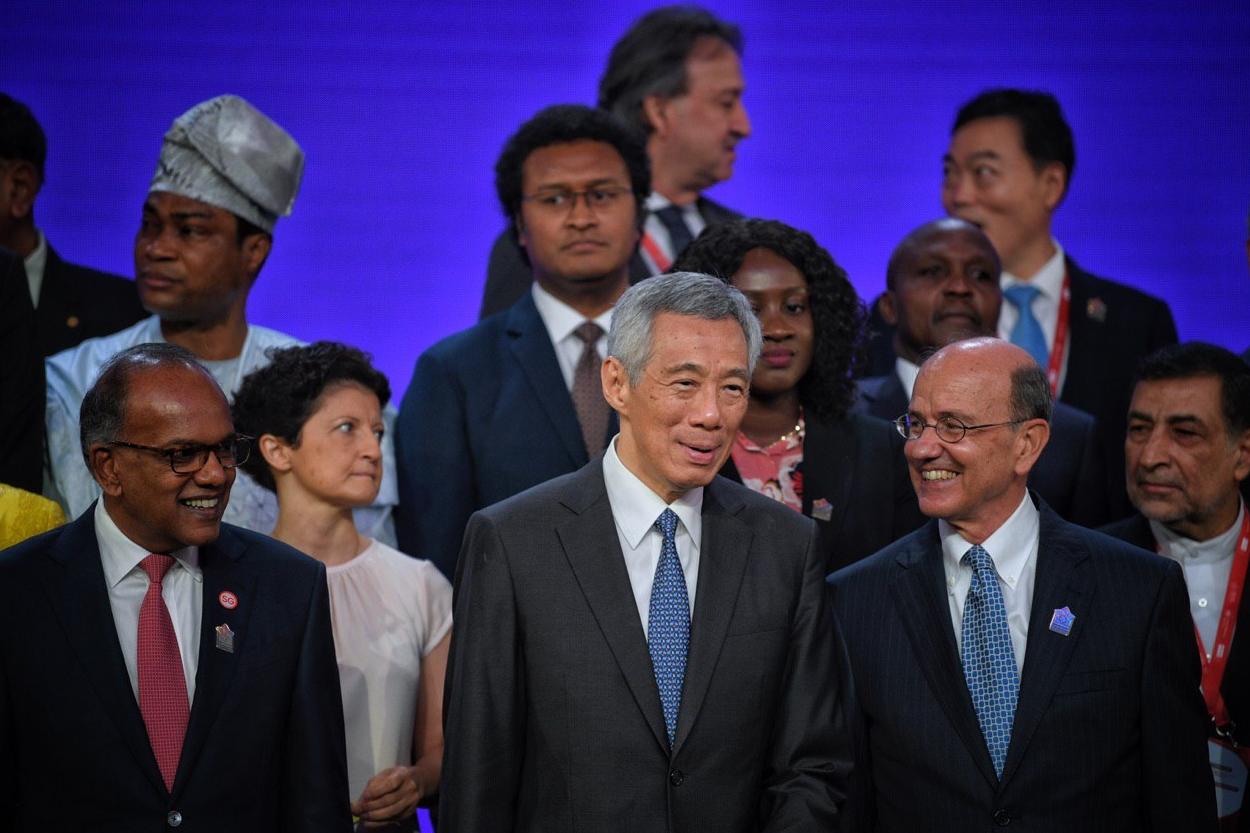Singapore Convention shows countries can come to consensus: PM Lee Hsien Loong
Sign up now: Get ST's newsletters delivered to your inbox

(From left) Home Affairs and Law Minister K. Shanmugam, Prime Minister Lee Hsien Loong and UN Assistant Secretary-General for Legal Affairs Stephen Mathias pictured during the signing ceremony on Aug 7, 2019.
ST PHOTO: MARK CHEONG
SINGAPORE - The Singapore Convention - a United Nations treaty signed in Singapore on Wednesday (Aug 7) which paves the way for mediation settlements to be enforced across borders - is a powerful statement in support of multilateralism, said Prime Minister Lee Hsien Loong.
It also demonstrates that countries are capable of achieving consensus, with effort, creativity, and leadership, he added.
"Today, a group of states have come together to recommit ourselves to multilateralism and to declare that we remain open for business, we are prepared to make binding commitments, and we are committed to preserving our relationships," said PM Lee.
At a ceremony held at the Shangri-La Hotel, Singapore became the first out of 46 countries to sign the international treaty, which is the first to be named after the Republic.
The UN Convention on International Settlement Agreements Resulting from Mediation was adopted by the United Nations (UN) General Assembly and named after Singapore in December last year.
Applying only to commercial settlement agreements, the treaty is the culmination of three years of work by more than 100 delegations, including country representatives and technical experts from observer, intergovernmental and non-governmental organisations.
United Nations Secretary-General Antonio Guterres, speaking via video conference at the ceremony, and UN Secretary-General for Legal Affairs Secretary-General Stephen Mathias, who declared the treaty open for signature, hailed the occasion for strengthening the rule of law and multilateralism.
Addressing ministers and officials from around the world at the ceremony, PM Lee said multilateral efforts have come under stress from widening inequality, with people losing confidence in multilateral institutions.
Highlighting this in his speech, PM Lee said: "But the solution is to improve it, not to abandon it."
He added that multilateral institutions have collectively brought growth and prosperity, and contributed to peace and security over the decades, and abandoning these institutions would upend the rules-based world order.
"Instead we need to reform them and bring them up to date. We must make sure that they reflect current economic and political realities, and ready them to deal with new issues created by the progress of technology and globalisation," he said.
PM Lee added that the alternative of a world without multilateral institutions and without widely accepted international rules, where might is right, disadvantages all countries, big and small.
"Such a world would be especially challenging for countries like Singapore," he added.
"That is why international treaties and the rule of law are especially important to us: Every word makes a difference, and when we sign a treaty, we will rigorously uphold what we have solemnly committed to."
PM Lee also pointed out that lengthy commercial disputes can severely disrupt business operations, damage reputations, hurt share prices and make it harder for companies to raise capital.
"A robust framework to manage such conflicts can prevent such disputes from escalating unnecessarily or causing unintended consequences," he said, adding that many businesses involved in cross-border disputes now rely either on arbitration, enforced via the New York Convention, or on litigation.
"The Singapore Convention on Mediation is the missing third piece in the international dispute resolution enforcement framework. Businesses will benefit from greater flexibility, efficiency and lower costs, while states can enhance access to justice by facilitating the enforcement of mediated agreements," said PM Lee.
Mediation involves a neutral party working with the different sides to come to an agreement, and is a less adversarial alternative to litigation and arbitration.
However, it has been limited, as mediated agreements are only contractually binding.
The convention, drafted and negotiated by a working group chaired by a Singaporean, is the latest example of Singapore's commitment to the UN and the international community, added PM Lee.
"We may be a small country, with limited manpower and no natural resources, but nevertheless we do our best to contribute our part," he said.
PM Lee cited Singapore's ambassador-at-large, Professor Tommy Koh, who chaired the Third United Nations Conference on the Law of the Sea that negotiated what became the UN Convention on the Law of the Sea.
Another more recent example is Ms Rena Lee, who was elected president of the Intergovernmental Conference on Marine Biodiversity of Areas Beyond National Jurisdiction (BBNJ) last year.
The treaty also reaffirms Singapore's role as an international business and legal centre but its work does not stop here, said PM Lee.
"The signing of the Singapore Convention marks the start of a long-term commitment by Singapore, to promote the Convention and see to its adoption," he said.
He added that Singapore and the UN will sign a Memorandum of Understanding (MoU) on a United Nations Commission on International Trade Law (UNCITRAL) Academy here, which will promote the development, understanding and use of international dispute resolution instruments globally.
"We will also continue our broader efforts to work with friends and partners to advance the cause of justice," said PM Lee.
For the treaty to come into force, at least three countries have to sign and ratify it.


